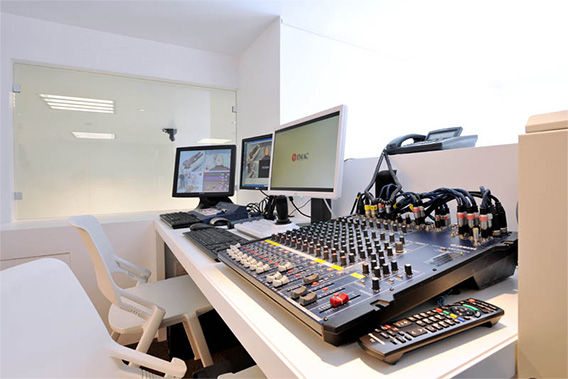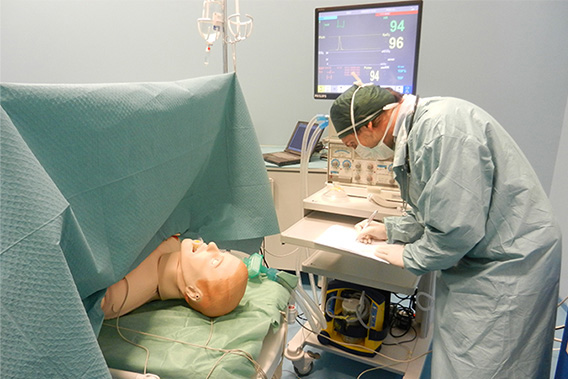Simulation
TRAINING IN MEDICAL AREA
Simulation, as an advanced practical training tool, is aimed at reducing the errors that healthcare workers can commit in the performance of their duties, causing serious damage to patients.
The idea behind the simulation is to repeat a certain procedure or surgery several times, even under pressure, also by verifying, evaluating and possibly correcting the procedural errors made during the training activities, in order to provide learners with greater preparation and useful experience for dealing more confidently with the problems that can arise in the real intervention.
The EMACCAMPUS simulation center, in order to train medical personnel individually and in teams, has an operating room equipped with medical devices and advanced patient simulators, which recreate a very realistic clinical experience.
The structure, in particular, is equipped with last generation robotic mannequins, capable of responding to drugs, simulating cardiac and pulmonary noises, healthy and pathological heart rates, as well as responding to intubation and defibrillation practices, which make it possible to reconstruct clinical cases and complex situations, very faithful to reality. The simulated activities allow to test and evaluate the reaction and problem-solving skills of the operators, both during normal procedures and also in the management of adverse events, which can be managed remotely, from a control room, by controlling the patient simulator through wireless connection.
The idea behind the simulation is to repeat a certain procedure or surgery several times, even under pressure, also by verifying, evaluating and possibly correcting the procedural errors made during the training activities, in order to provide learners with greater preparation and useful experience for dealing more confidently with the problems that can arise in the real intervention.
The EMACCAMPUS simulation center, in order to train medical personnel individually and in teams, has an operating room equipped with medical devices and advanced patient simulators, which recreate a very realistic clinical experience.
The structure, in particular, is equipped with last generation robotic mannequins, capable of responding to drugs, simulating cardiac and pulmonary noises, healthy and pathological heart rates, as well as responding to intubation and defibrillation practices, which make it possible to reconstruct clinical cases and complex situations, very faithful to reality. The simulated activities allow to test and evaluate the reaction and problem-solving skills of the operators, both during normal procedures and also in the management of adverse events, which can be managed remotely, from a control room, by controlling the patient simulator through wireless connection.


The presentation of the clinical case, the introduction and the post-simulation debriefing are carried out in a dedicated plenary room, complete with multimedia equipment which also allows for resuming theoretical lectures and providing copies, in electronic format, to the students, at the end of the courses. Furthermore, real-time images of what happens inside the operating theater are projected during the simulation in the plenary room, so as to allow even those who do not participate directly in the reconstruction of the clinical case to compare their own experience with what is happening.
The simulation center is now home to several training courses concerning not only outpatient and operative practice, but also the correct use and operation of robotic rehabilitation devices. The center has, in fact, supplied various equipment for the rehabilitation of the upper limb and for functional recovery of the path (exoskeleton robots) which are used by expert operators to hold courses aimed at training doctors, physiotherapists and health professionals. These activities make it possible to simulate the use of these instruments during rehabilitation sessions, in order to make the staff more confident and prepared, in view of direct action on pathological subjects.
The simulation center is now home to several training courses concerning not only outpatient and operative practice, but also the correct use and operation of robotic rehabilitation devices. The center has, in fact, supplied various equipment for the rehabilitation of the upper limb and for functional recovery of the path (exoskeleton robots) which are used by expert operators to hold courses aimed at training doctors, physiotherapists and health professionals. These activities make it possible to simulate the use of these instruments during rehabilitation sessions, in order to make the staff more confident and prepared, in view of direct action on pathological subjects.
Simulation is of fundamental importance for teaching and practicing clinical practice.
Training in medicine through simulation helps to develop the individual operators skills (doctors, nurses, technicians, pharmacists etc.) in practical management and group action, improving their efficiency and safety.
In particular, we address operators in the following disciplines:
Training in medicine through simulation helps to develop the individual operators skills (doctors, nurses, technicians, pharmacists etc.) in practical management and group action, improving their efficiency and safety.
In particular, we address operators in the following disciplines:
- Anesthesia
- Intensive care
- Emergency Medicine
- Nephrology and Dialysis
- Cardiology
- General Surgery
- Diagnostic and interventional radiology
- Pediatrics and neonatology
- Obstetrics and Gynecology
The Emac Campus training courses include the use of the following advanced simulators:
- SimMan 3G latest generation wireless simulator with the possibility of creating complex clinical scenarios (adjustable upper airway conformation, cardiac, pulmonary, and intestinal noises, ventilable lungs, automatic recognition and creation of drug response curves).
- 2 Advanced simulators for Cardiopulmonary resuscitation training (rCP)
- Nursing simulator for the practice of assessment procedures and complete patient care.
- Advanced air-way management trainer.
- Simulators for echo-guided insertion of central venous catheter (subclavian , supraclavicular, jugular and femoral).
- Simulator for the development of basic surgical skills.
- Surgical trainer for video laparoscopy.
- Surgical simulator for cholecystectomy operations.
- Advanced surgical simulator for laparotomy.
- TraumaMan surgical simulator for training on advanced incision and suture techniques such as insertion of thoracic drainage, centesis pericardium, thoracic decompression, percutaneous tracheotomy, peritoneal lavage.
- Ultrasound simulators and for guided intravenous echo techniques.
- Possibility of using other state-of-the-art advanced simulators in the maternal and child sector.


